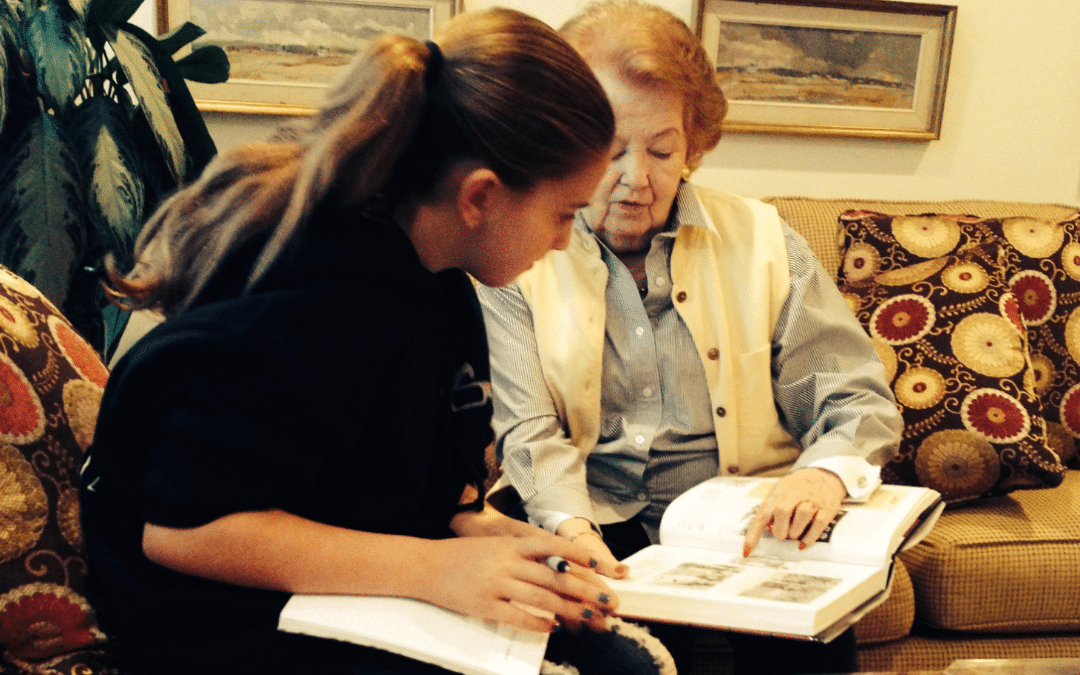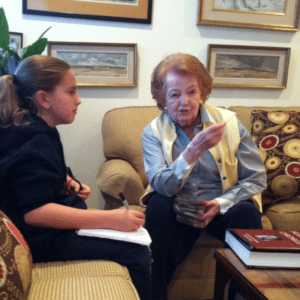
Holocaust Survivor’s Story, Told Through a Teen’s Eyes — And Why It Still Matters
This isn’t my usual post. I’m not talking about customer loyalty strategies or how to build a better employee experience. But is still about experience — just not the kind you typically measure in a survey.
I’m writing about the kind of experience that changes you. The kind that wakes you up, shifts your perspective, and reminds you what really matters. And if we’re going to build better businesses, lead with more heart, and connect in deeper ways — we’ve got to start by listening to stories like this one.
Life is about experiences. Some are not good ones — yet we need to have uncomfortable conversations and reflect so that they never repeat. Fortunately, this happens every April with the Remembrance of Victims of the Holocaust. It’s a time when people across the United States pause to remember the victims and survivors. And while there are days set aside to reflect on the past, our appreciation for people and their stories isn’t bound by a date.
In my work, I talk a lot about experience — what it means to lead with it, build around it, and create it intentionally. But underneath it all is empathy. And empathy isn’t a buzzword. It’s a commitment. A mindset. A practice.
For her Bat Mitzvah project, my daughter Lindsey — 13 at the time — spent hours interviewing a Holocaust survivor named Marsha Kreuzman. I sat beside them during many of those interviews, and I can tell you: what Marsha shared, and how Lindsey captured it, moved me in ways I didn’t expect.
Empathy doesn’t happen in a vacuum. It happens when we lean in. When we listen. When we allow someone else’s experience to teach us something about being human.
That’s what this story is. It’s history. It’s heartbreak. And it’s a reminder that sometimes the most powerful stories come from the quietest voices — like a 13-year-old girl holding space for a woman who survived the unthinkable.
Lindsey’s words follow next. This is her voice. Her lens. Her heart on the page.
Read it slowly. Let it land.
Because you never know what someone has lived through — not your colleague, not your customer, not the stranger who seems “off” that day. Everyone has a story. And empathy? It starts by honoring that.
Interview Summary by Lindsey (Written at Age 13)
Marsha Kreuzman is living proof that the Holocaust was one of the saddest moments in history. For my Bat Mitzvah project, I chose to interview a survivor of this dreadful time in history. I picked this as my project when I realized that I am the last generation to hear the real-life story from a Holocaust survivor.
This mitzvah project was special to me, not only because I was hearing an experience from a true survivor, but also that my Bat Mitzvah date is the same day as Holocaust Remembrance Day. I spent a few weeks interviewing Marsha and learning her story.
The Holocaust Survivor’s Story: Early Experiences
A Life Marked by Hate
The first day I met Marsha, I realized how cruel the Germans were. They killed, beat, starved, and shot so many Jewish people, as well as people from other cultures. Each time Marsha brought up something sad that she had witnessed or was forced to be a part of, it made me want to cry and punch someone. Her story not only touched me emotionally but also changed how I “see” people. You never know if a random person is going to be your friend or turn against you later in life, as Marsha never could have predicted. Life is a mystery.
Marsha’s Early Life in Kraków, Poland
Marsha is now 90 years old (or young, I should say). The story of her life is unbelievable and must be remembered. She was born in Kraków, Poland, on May 18, 1923. Poland was a very anti-Semitic country, even before Hitler came to power. People were prejudiced and hated Jews for no reason.
Marsha went to a Catholic school growing up and hardly had any friends since she was the only Jewish girl in her school. Not only was it hard to be a Jew, but she also found it difficult to have red hair. Most people had light-colored hair and blue eyes. This made Marsha feel very different.
Despite some challenges, she lived in a nice apartment while growing up in Poland. “It was comfortable,” as Marsha told me, even though they had no inside bathrooms. She got used to having to go to the outhouse. What was harder to deal with was that her older brother was diagnosed with diabetes. He needed insulin twice a week, which was expensive, and Marsha’s family was not wealthy. There was no such thing as medical insurance then. Fortunately, Marsha’s American relatives were doctors and were able to help by sending insulin to them in Poland for a period of time.
The Turning Point: The Night of Broken Glass
The Beginning of Unthinkable Cruelty
November 11, 1933, was a memorable and sad day. It was the first time they knew for sure that trouble had arrived. It was “the Night of the Broken Glass.” Jewish businesses were trashed. Windows and lights were broken. Temples and Torahs were burned and destroyed. It was clearly the beginning of the Nazi War to get rid of all Jews. From this point forward, life got harder.
The Loss of Freedom and Possessions
Marsha remembers September 1, 1939, when her family was no longer allowed to receive insulin. As time went on, Hitler became more powerful and robbed the Jews of all their possessions, including jewelry, food, money, valuable artwork, and homes. I felt sad when I heard the Germans ripped off a gold watch from Marsha’s hand, which she received as a present from her parents when she was ten years old. It was also upsetting to hear that Marsha and her family were forced to evacuate their home when the Polish people took it over. Life was no longer how she knew it. It truly became a nightmare!
Life in the Ghetto and the Struggle to Survive
The Ghetto and Daily Horrors
As bad as it seemed up to this point, it only got worse. Over the next few years, Marsha witnessed many horrible events. One included the Germans taking young people away from their families to shoot them just because they felt like it. Those women and girls who were fortunate enough to be kept alive had to work terrible jobs for the Germans. Marsha’s family was taken to the ghetto in Kraków (on the other side of the river) with thousands of others. The ghetto was surrounded by barbed wire, so no one could escape. It was horrible in the ghetto, where people were getting shot and dying right in front of Marsha on a daily basis for no reason.
Heroes in Dark Times: Oscar Schindler
There was some help for the Jews, thanks to people like Oscar Schindler. He provided factory jobs and food for over 1,200 people. It was a chance to survive. There were others who were somewhat “good” as some Germans snuck food to the Jews, even though this came at a cost for help. The Germans wanted to be paid for the risk they had to take. If caught, they would immediately have been killed themselves for helping any Jews.
The Concentration Camps: Auschwitz, Bergen-Belsen, and Beyond
The Horrors of Auschwitz
Marsha was sent to Auschwitz, the worst place on earth. She walked there through the biggest snowstorm she ever saw. They were given few clothes to stay warm. No blankets. They walked for 5 days and 4 nights, almost 24 hours a day. It’s hard to imagine them walking so far, with only “schmatas” (rags) on their feet. It is no surprise that so many dropped while walking, dying of exhaustion and hunger. It’s amazing there were any survivors!
When they finally arrived at Auschwitz, Marsha and the others were barely given anything to eat or drink. The camp was worse than Marsha imagined. She saw so many dead people around her. Marsha remembers thinking she was “walking on stones,” when in fact they were dead bodies. The Germans wanted her and others to dig holes for the dead people, but they couldn’t because the grounds were frozen. She remembers she put the bodies flat on the ground and covered them in snow. She remembers wishing she were dead too, even if the rumors were true that the Russians were coming to liberate them. No one knew for sure.
Bergen-Belsen: Starvation and Suffering
Marsha remembers the time she was forced to travel to another concentration camp in Bergen-Belsen, Germany, in an overcrowded train. There was no room at all. She couldn’t even lie down or she would get trampled. They finally arrived, absolutely starving. She explained how the Gestapo sent her to the field to look for potatoes. She found frozen potatoes that smelled, tasted, and looked like horse manure. She had no choice but to eat these rotten potatoes. For water, they only had the snow on the ground. Hunger and exhaustion was something she had to live with.
Mauthausen: The Final Ordeal
Marsha talked about her experience at Mauthausen in Austria, another concentration camp. There was a quarry there. She was forced to carry stones up lots of steps and then down again with nothing to eat or drink. It was hard and exhausting.
Liberation and New Beginnings
A Moment of Freedom
A life-turning moment came on May 3, 1945, when two prisoners jumped in the river and swam to Lind, where Americans were reported to be. They told their stories to General Eisenhower and Patton, and soon the camp was liberated. At one point, Marsha was leaning against a crematorium door at Mauthausen, ready to die, when she heard the words “you’re free!” She had looked up and saw an American soldier, and at that moment, her body gave out. She fainted. They picked Marsha up, weighing only 68 pounds, and took her for medical help at the local field hospital. She was given IVs, and medicine, and was told she had to get up and walk around or she might die.
Rebuilding a Life
Marsha eventually stayed in Lind at a “displaced person’s camp” for one and a half years. Her Aunt saw an ad the soldiers put in the newspapers with the names of the people in the displaced persons camp. She recognized Marsha’s name and immediately sent for her.
Life slowly continued to get better for Marsha. She got to study medicine, her lifelong dream. She was accepted into a University in London, England. Eventually, Marsha met a man who had known her in the ghetto. They married, and soon after, Marsha received her visa to come to America.
Final thoughts about Marsha Kreuzman and the Holocaust :
Although listening to the stories during my visits with Marsha were upsetting, I know that she doesn’t want me or anyone else to feel badly for her. She explained that she wants people to know that the Holocaust really did happen. There are people who are “Holocaust deniers”, who say it never happened. My generation has got to keep the world informed about what really happened to people like Marsha. I am part of the last generation to meet survivors and retell their story to future generations. Marsha made me realize that what happened in World War II should never happen again, and it could if people don’t learn from history. I am grateful to have had this sad but important experience with Marsha. I believe her story will continue to impact me as I get older. I plan to share my interview notes and photos with my kids some day.
As I saw at the Holocaust Museum, “Never again!”
Coming Back to the Core: Why This Holocaust Survivor Story Still Matters
As you finish reading this story, I hope you carry it with you. Not just as history, but as a call to look at the people around you differently.
Because empathy — real empathy — isn’t just a value we talk about. It’s a way we choose to live. In every conversation. In every reaction. In every moment, we meet someone who isn’t us.
You never know what someone has been through. You never know their family history, their loss, their quiet strength. But stories like Marsha’s invite us to pause, to feel, and to remember — and to carry that mindset into every room we walk into.
Some experiences must be shared, so they’re never forgotten. And some stories must be remembered, so we never lose our humanity — especially in a world racing to automate everything, connect less, and scroll past what really matters.
Let’s remember what CANNOT be programmed: empathy, humanity, and heart.


